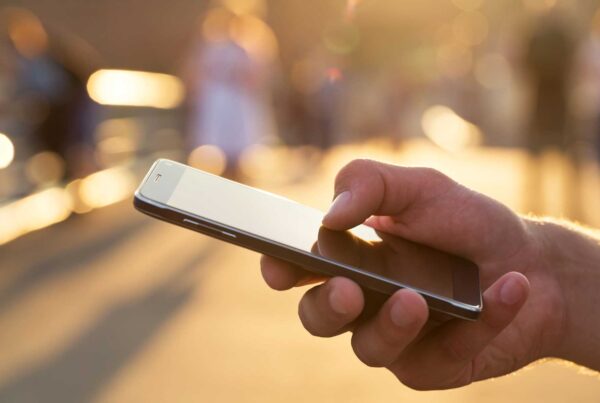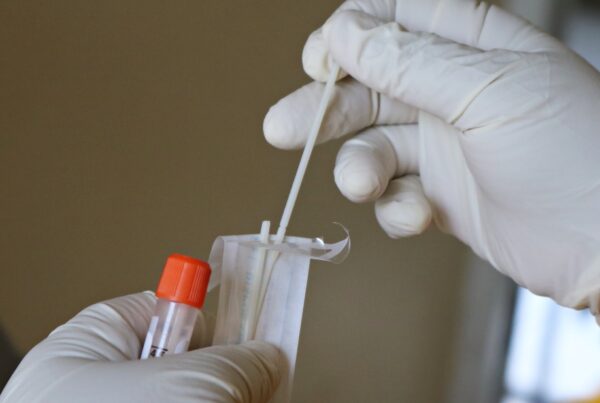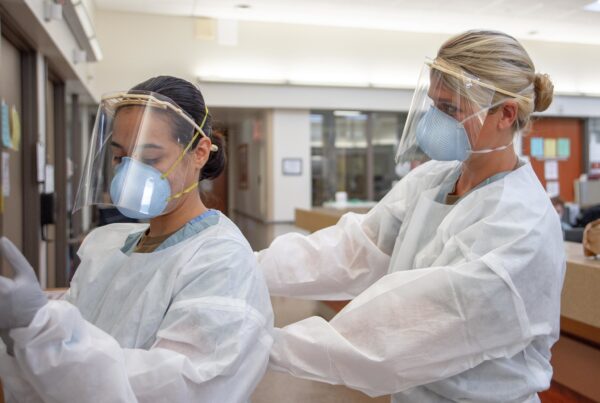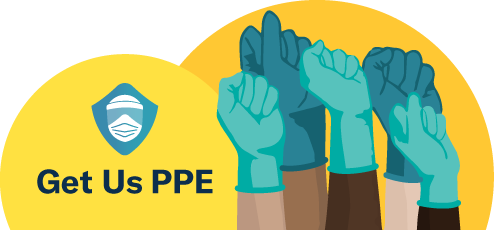By Rebecca Finkel
The Big Picture: Natural Disasters Complicate a Crisis
This week saw an increase of nearly 300,000 cases of COVID-19 in the U.S., bringing the total to 5,799,046 total cases. The states that saw the highest increases were California, Texas and Florida. Complicating this challenging public health situation are concurrent natural disasters: the wildfires in California and Hurricane Laura, which landed on the Gulf coast on Thursday. Each of these situations caused people to evacuate, creating a need for PPE at shelters. Shelters, which can be crowded, are at particular risk for creating super spreader events. The decreased air quality and sheltering in California also is of particular concern, as it can put people with COVID-19 at risk for worse outcomes.
Get Us PPE has begun coordinating with organizations already working on disaster relief on the ground in wildfire- and hurricane-prone areas. FEMA Region 6, a local arm of the Federal Emergency Management Agency, connected us with the leadership of another group, National Voluntary Organizations Active in Disaster (VOAD). We began collaborating with VOAD, and their California branch is helping us identify PPE shortages related to wildfires and deliver PPE donations to communities and frontline workers affected by the fires.
Focus: School Reopenings
As schools reopen nationwide, K-12 teachers and students preparing for in-person or hybrid learning schedules may face challenges in acquiring a supply of PPE, such as masks, disinfectants and hand sanitizer, adequate to their needs. The CDC recommends the use of masks in a K-12 setting by both teachers and students, but acknowledges that certain students with disabilities may have trouble wearing masks and that deaf or hard of hearing students may benefit from the use of clear masks or face shields in the classroom.
Get Us PPE will soon be launching an initiative, PPE for Schools, to address PPE shortages in the educational space. We plan to connect schools with local makerspaces that can produce PPE, such as 3D-printed face shields, for teachers and school staff.
Beyond K-12 schools, child care centers and colleges and universities continued to open across the country, with mixed results. A study of child care centers in Rhode Island (a state with low rates of coronavirus compared to other U.S. states), showed only four suspected cases of secondary transmission in 666 child care centers. In other words, only four people are suspected to have caught the coronavirus at school. The researchers cite that this very low rate was likely the effect of reduced class sizes and the use of face masks.
On the other hand, some colleges and universities that allowed students and faculty back on campus had to rapidly change course after a couple of weeks. For example, UNC Chapel Hill switched to online-only classes after 130 students tested positive within the first two weeks of classes. Get Us PPE founder Megan Ranney commented to CNN that, “It’s up to those colleges to make it easy for those kids to do the right thing, to do regular testing, have mask mandates, have masks easily available, and if needed, to shut down those campuses.” At the time of this posting, a New York Times survey has tracked more than 26,000 cases of COVID-19 at more than 750 colleges.
This Week at Get Us PPE
Get Us PPE is gearing up to meet the PPE needs of schools reopening in person with the launch of the PPE for Schools Fund. This fund enables us to provide grants to makerspaces to produce PPE for students and staff, including custom PPE appropriate for a learning environment. Through our new PPE for Schools initiative, we will match and help coordinate these donations from makerspaces to schools.
We are also excited to announce a new partnership with Votanik Medical, a supplier of FDA-approved PPE that offers the lowest prices possible to small customers that don’t usually have access to a PPE supply chain that allows them the discounted rates that bulk buyers enjoy. CFO Mark Desgraves participated in a Back To School roundtable hosted by Get Us PPE that included representatives from the National Association of School Nurses, Nation of Makers, the C19 Coalition, and Project N95. These roundtables will occur biweekly to explore opportunities for collaboration.
Next week we will launch the Get Us PPE Shortage Index, which will draw from our database — the nation’s largest non-governmental record of PPE needs — to show where and how the PPE shortage is affecting frontline workers in the United States. The PPE Shortage Index, updated monthly, will provide the first comprehensive, in-depth picture of the PPE shortage nationwide. This data will be a valuable window into the ongoing PPE crisis and can inform future equitable distribution models.
Success Stories
Here are some highlights from recent PPE deliveries and fundraising initiatives:
- Sanctuary Clothing, a clothing designer recognized by Vogue for their stylish and functional mask designs, passed the 100,000 units donated mark with a shipment gratefully received by a primary care office in Southwest Florida! We appreciate their continued generosity.
- New York-based guitar pedal retailers Death By Audio launched Protection by Audio, a popup shop of music gear donated by big-name musicians, such as Wilco, The Black Keys and Queens of the Stone Age. All proceeds will benefit Get Us PPE.
- Vencerémos, a worker-based organization in Arkansas that advocates for the rights of poultry workers, received a shipment of gowns and is anticipating another shipment of masks. This essential protective gear will be distributed to poultry workers in their local area, as their industry has experienced multiple large-scale COVID-19 outbreaks since the pandemic began.




